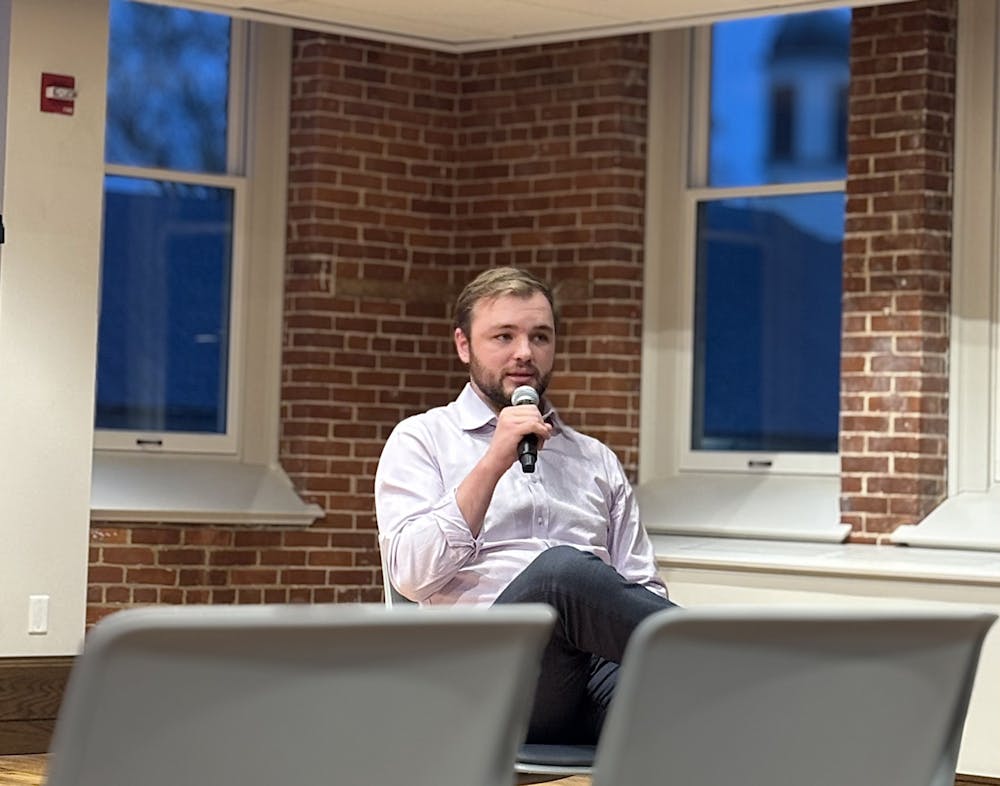
“If I’m really serious about getting better, I need to get better,” said Luther Kissam V.
Cole Kissam, otherwise known as his pen name Luther Kissam V, is a poet and writer from Charlotte, North Carolina. On April 10, he spoke at an event in Stewart Hall inspired by his first book called “Have I Told You About My Superpowers?”
The event was sponsored by the SU Connection Alcohol and Other Drugs Program, English Department, Psychology Department and National Alliance on Mental Illness.
Kissam, beyond his writing and poetry, is a strong mental health advocate. He has been vocal about his experiences with bipolar disorder, as he believes that activism about these topics is important to bring to the forefront.
“I have a lot of empathy for other people because I’ve gone through a lot of suffering and understanding,” Kissam said. “More than any of that, to manage my bipolar disorder, what I realized was that I had to make commitments to myself about how I was going to live my life.”
His book “Have I Told You About My Superpowers?” was published in 2022. The book is separated into three sections, which are labeled as “Lithium,” “Lamotrigine” and “Lithium & Lamotrigine: Maintenance.”
The first section is about his experience with mania; the second is about his experience with depression; and the third is about his experience trying to remain stable with his bipolar disorder. Each of these sections are named after the medications he takes in order to easier manage his diagnosis.
Kissam explained his previous feelings of mania as a euphoric feeling; however, these feelings were short-lived. He explained scenarios in which mania had negatively affected his own life. Additionally, he expressed that now, he would rather feel depression than mania because his mania led him to decisions that he wouldn’t normally make. However, the goal is stability and positivity.
Since being diagnosed with bipolar disorder, Kissam found a space to encapsulate the feelings that he’s experienced throughout his life in a narrative-style work of poetry.
“I have to live a life of moderation. I mean, I don’t do anything [like] all the time, all the time, all the time,” Kissam said. “I think that the thing I’m most hardcore about is writing poetry.”
Kissam is open about his experiences as a means to prove that mental illness can be regulated, and life does not have to end because of a diagnosis, nor should it.
Before reading a poem about the winters in Pennsylvania, Kissam described the feeling of wanting to manage his mental health. Along with his bipolar disorder, Kissam has seasonal affective disorder. He then mentioned the fact that this was the first year that he did not have a depressive episode, and he said, “I think what helped me was a deep understanding that all of my feelings are temporary, and so that even on my best day, I won’t feel the best forever. And on my worst day, I won’t feel the worst forever.”
“By all means, I still have bad days. But I haven’t had an episode in over 18 months, and I haven’t been in crisis in four years,” Kissam said.
Kissam ended the event with a final poem, and it was called “Poem in Which I Use My Skills Effectively.” The last line of the poem, which was reiterated through the body of the writing, was “I really can. I really do.” He, then, added, “And you guys all can too.”
The work put in by Kissam in order to strengthen and enrich his personal life is inspirational. Additionally, his work to advocate for mental illness is an example that should be followed for others to break the stigma of mental health.
Kissam alluded to a future body of writing that could focus on grief and loss. He mentioned some of the losses that he has witnessed in his life during the event, and he said that wanted to write about those feelings, situations and effects in a rhythmic way.
“I realized that I really, really wanted to be alive — that as bad, as hard, as painful as life can be, it is so much better than the alternative for me, right now, and back then, too,” Kissam said.
For more information and resources:
National Suicide Prevention Lifeline: 988
Suicide Prevention Lifeline Website
Drug and Alcohol Addiction Hotlines
NAMI at Shippensburg University


The Slate welcomes thoughtful discussion on all of our stories, but please keep comments civil and on-topic. Read our full guidelines here.